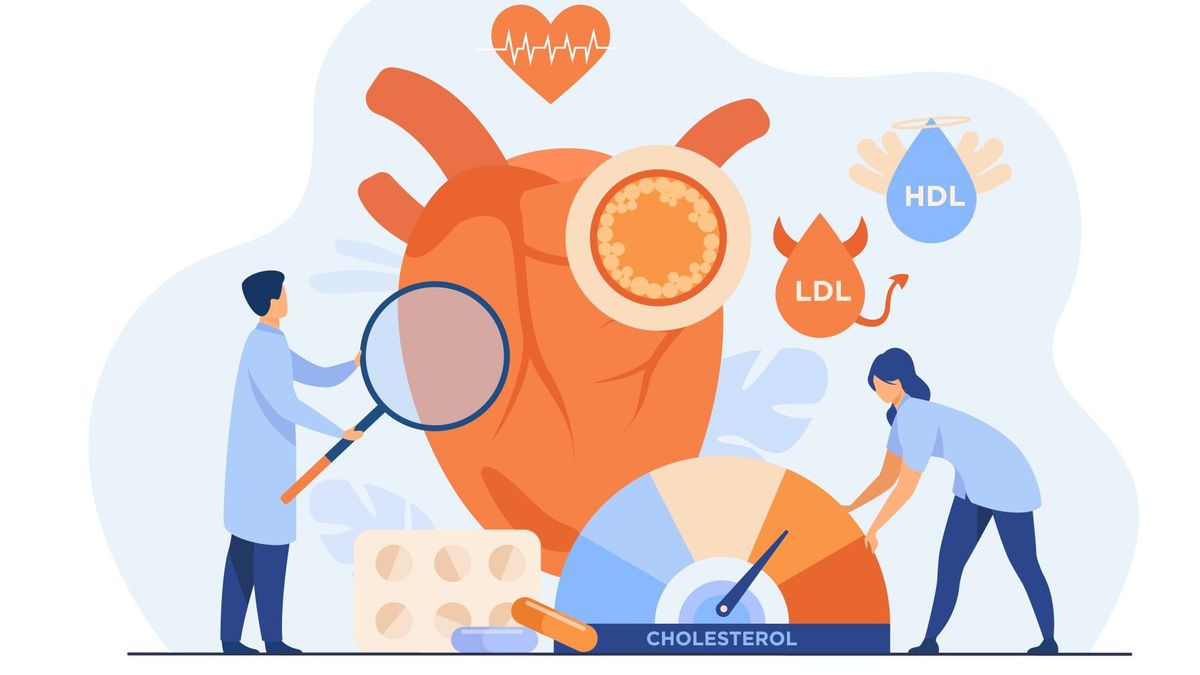
YOGYAKARTA Cholesterol levels will be high when there are too many fats and lillin substances in the blood. This can cause arterial blockage that makes a person at risk of developing heart disease, heart attack, and stroke. Especially low-density lipoprotein cholesterol or LDL cholesterol. If lipoprotein is high density or HDL cholesterol, it is a type of cholesterol either that helps clean the arteries. To avoid increasing LDL or decreasing HDL, recognize the factors that affect cholesterol levels below.
Food is the most contributing factor to levels of unhealthy cholesterol in the body. The heart processes most of the body's cholesterol. However, most cholesterol from foods is higher in saturated fat. So, limit the consumption of red meat, pure milk or full fatty milk products, butter, shells, and eggs. Also avoid consuming foods containing trans fats, such as pastries, cakes, biscuits, and margarine.
People with any weight can have high cholesterol, reported by WebMD, Wednesday, October 25. But more often experienced by someone who is overweight because excess weight slows cholesterol disposal in the body.
Walk or cycle at high intensity every day for your overall fitness and cholesterol levels. Too little exercise can cause weight gain, which affects cholesterol levels. It's important to know, aerobic exercise helps increase HDL even when you don't change your diet. But exercise doesn't help lower LDL levels unless you change your diet and lose weight.
Chemicals in tobacco smoke damage the walls of blood vessels and make it easier for LDL cholesterol to stick to these walls. Smoking also lowers levels of HDL cholesterol. This narrows blood vessels and thickens blood, forcing the heart to work harder to pump enough blood into your body.
Some chronic diseases cause too much inflammation in your body. At a healthy level, inflammation is the natural response of your immune system to injury or disease. In the short term, this helps your body recover. But if it persists in the long term, inflammation can lower HDL cholesterol and increase LDL. Inflammation that affects cholesterol, can be due to lupus disease, psoriasis, rheumathoid arthritis, intestinal inflammation, Sjogren syndrome, gum disease, and some infections due to bacteria and viruses.
For pregnant women, it is important to maintain a diet. In addition to their health, it is also for optimal development in the fetus. During pregnancy, the liver makes extra cholesterol to give nutrients to the growing baby. In the third trimester, cholesterol levels may be 2-4 times higher than before pregnancy. Cholesterol levels remain high for about a month after giving birth. Then drop back to the level before pregnancy.
If you start a pregnancy with low HDL and high LDL cholesterol, you may have a higher risk of experiencing pregnancy problems or heart disease in the future. It's important to consult your doctor so that your cholesterol levels are in a healthy range before you try to get pregnant.
While stressed, the body releases the cortisol. These hormones can increase your cholesterol levels. Stress also affects cholesterol levels in other ways, such as by eating without calculations to calm down. Sometimes also busy dealing with stress so as not to exercise and this affects cholesterol levels.
Although blood sugar is controlled in people with type 2 diabetes, it still affects decreasing HDL and increasing LDL cholesterol. Increase cholesterol with low density lipoprotein, it will bring a type of fat called triglyceride to your body's tissue.
Some people have high LDL cholesterol due to gene congenitals. Called the Facilial Hypercholesteroleemia (FH), which is a family downgraded condition. The effect is that the body finds it difficult to remove LDL from the blood. About 90 percent of people with FH don't know that they have it. So it's a good idea to check cholesterol levels regularly to control other risk factors.
With age, the body cannot remove cholesterol from the blood as well as when they were young. That's one reason the risk of heart disease increases with age. In addition, women tend to have lower LDL cholesterol and higher HDL than men. But when menopause, LDL levels tend to increase.
관련 항목:
Those are ten factors that affect cholesterol levels in the body. It is important for you to routinely check cholesterol levels. The goal is to reduce the risk of experiencing chronic diseases and keep your body healthy until old age.
The English, Chinese, Japanese, Arabic, and French versions are automatically generated by the AI. So there may still be inaccuracies in translating, please always see Indonesian as our main language. (system supported by DigitalSiber.id)

















